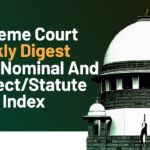Supreme Court to Hear Case of Charles and Kathleen Moore Over Unconstitutional Tax Bill
Charles and Kathleen Moore, of Redmond, Washington, are about to have their day in the Supreme Court over a $15,000 tax bill they contend is unconstitutional. The couple claim they had to pay the money because of their investment in an Indian company, and they are hoping that the Supreme Court will overturn the decision and grant them a refund.
Unconstitutional Tax Bills and the Supreme Court
When the government issues a tax bill that is deemed unconstitutional by a court, the Supreme Court is the ultimate authority. The Court can either uphold or overturn a previous decision, and in the case of the Moores, they are hoping for a favorable outcome. The Supreme Court has the power to decide if certain tax laws or regulations are unconstitutional and, in turn, grant individuals the right to have their tax bills waived or reduced.
The Case of Charles and Kathleen Moore
Charles and Kathleen Moore are the owners of an investment in an Indian company. According to the couple, they were charged an unconstitutional $15,000 tax bill, which they were unable to pay. As a result, they filed a lawsuit in the Supreme Court, claiming that the tax bill was unconstitutional and that they should be entitled to a refund. It is unclear how the Supreme Court will rule on the case, but the Moores are hopeful that their case will be successful.
The Relevance of Unconstitutional Tax Bills
Unconstitutional tax bills are a serious issue for taxpayers, as they can lead to financial hardship and confusion. Taxpayers may become overwhelmed by the amount of money they owe and unsure of their rights when it comes to challenging a tax bill. It is important for taxpayers to be aware of their rights, and the Supreme Court can provide a valuable resource for those who are facing an unconstitutional tax bill.
The Rights of Taxpayers and the Supreme Court
Taxpayers have the right to challenge an unconstitutional tax bill in the Supreme Court. The Court can either uphold or overturn a previous decision, and in the case of the Moores, they are hoping for a favorable outcome. Taxpayers should be aware of their rights when it comes to challenging a tax bill, and the Supreme Court is a valuable tool for those who are facing an unconstitutional tax bill.
The Supreme Court and the Future of Tax
The Supreme Court’s decision in the case of Charles and Kathleen Moore will have implications for the future of taxation in the United States. If the Court rules in favor of the Moores, it could set a precedent for other taxpayers in similar situations. It could also lead to changes in the law, which could benefit taxpayers in the long run. It is important for taxpayers to be aware of their rights when it comes to challenging a tax bill, and the Supreme Court is a valuable resource for those who are facing an unconstitutional tax bill.
Conclusion
Charles and Kathleen Moore are hoping that the Supreme Court will rule in their favor and grant them a refund for their unconstitutional tax bill. The case has the potential to set a precedent for other taxpayers in similar situations, and it could lead to changes in the law that would benefit taxpayers in the long run. It is important for taxpayers to be aware of their rights when it comes to challenging a tax bill, and the Supreme Court is a valuable tool for those who are facing an unconstitutional tax bill.

